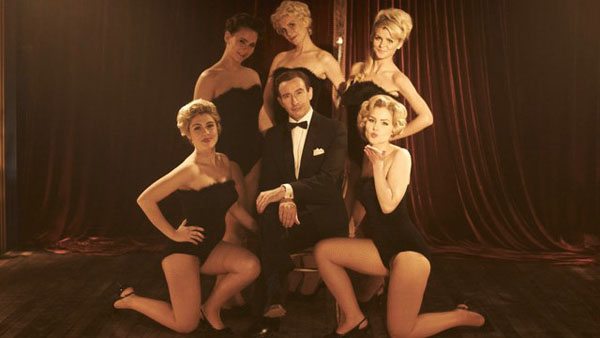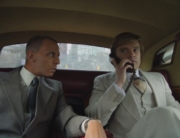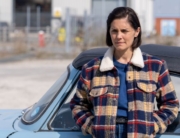After an eclectic career that covers art house, neo-noir, docudrama, and comedy, prolific director Michael Winterbottom brings us a biopic of Paul Raymond, Britain’s counterpart to America’s Hugh Hefner. British comedian and actor Steve Coogan, a regular Winterbottom collaborator, plays the controversial entrepreneur who amassed a fortunate from revue bars, porn, and real estate to become Britain’s richest man. The film opens with Raymond driving through London’s Soho with his young daughter Debbie guessing which properties he owns, and then flashes back to the 1950s and Raymond’s meteoric rise.
Brought up by a his single mother in Liverpool, Geoffrey Quinn reinvented himself as Paul Raymond, and worked the pier show circuit with a mind reading act before “arriving in London with five bob in his pocket,” which he boasts of numerous times. Reading the times and knowing sex sells, he produces revealing revues that challenge the laws on nudity and land him in court. In the press, he is dubbed “the king of the keyhole shows.” With Jean (Anna Friel), his wife and mother of his children, Debbie and Howard, he opens Raymond’s Revuebar in 1958, a, groundbreaking club exclusively for members only in order to circumvent the laws. The U.K.’s first strip club, it attracted a celebrity audience to its extravagant burlesque and strip tease shows.
From the origin of his empire, the film comically charts his ambition and showmanship as he pushes the boundaries of acceptability, clashes with authority, and amasses property on a scale fit for the “king of Soho.” After the repeal of nudity laws in 1968, Raymond purchased and staged flamboyant theater productions that are beautifully recreated by designer Jacqueline Abrahams, with costumes by Stephanie Collie.
His relationship with three women are pivotal: wife Jean; daughter Debbie (Imogen Poots); and lover Fiona Richmond (Tamsin Egerton). As the 1970s dawn, black and white gives way to color, and Raymond’s open marriage to Jean flounders when chorus girl Fiona enters his life. His fortune and notoriety are cemented by his rapid expansion into porn publishing and an acrimonious, public break up, resulting in the largest divorce settlement to that date.
Jean departs for Miami with their son, leaving Debbie in England with her father who dotes on her. After the wayward teen is expelled from an exclusive boarding school for smoking weed, he sends her to drama school, and she later enters his high-octane world, singing in a show especially produced for her. Lacking the talent and charisma to capture the audience, she floats adrift professionally and privately, amid the cocaine, pills, and orgies.
As the flamboyant entrepreneur, Steve Coogan is witty and compelling while Imogen Poots is heartbreaking as his sensitive daughter. By turns, she is excruciatingly vulnerable and a spoiled brat. Bon viveur Raymond exposes her to all the aspects of his lifestyle without exercising parental discretion. After catching her snorting coke, he simply cautions her to “Get the good stuff.” Although overshadowed by the episodic script, their relationship carries the emotional heart of the film.
As the vicar’s daughter-turned-sex symbol Fiona Richmond, Tamsin Egerton gives a finessed performance, and Chris Addison is manic as Tony Powers, the drug fueled porn editor pushing the boundaries of obscenity, and the supplier of Debbie’s developing coke habit. A host of iconic British comedians are cast in supporting roles and cameos providing wonderful one-liners and surreal scenes, such as the clubs’ resident vicar tending to his flock, surrounded by topless girls in their dressing room. The real-life vicar went on to write a book about his experiences.
The film captures Soho wonderfully, shot in many of the original, iconic locations. The French House pub, Ronnie Scott’s Jazz Club, and Maison Bertaux are still owned by the Raymond grandchildren. The cinematography by Hubert Taczanowski exquisitely evokes the periods in black and white and color, seamlessly shifting over nearly four decades. Iconic tracks dictate the transitions—Soft Cell’s “Tainted Love” plays during an ’80s S/M show.
The film is more interested in the outline of Raymond’s life rather than the wider social context. It neither attacks censorship nor addresses the feminist backlash. Raymond’s lack of engagement with the debate in the ’70s is acknowledged in one press conference scene. He emerges as a contradictory character with identity issues. His life appears as a performance in which he only exists in the spotlight.
A stylish piece of filmmaking, The Look of Love opens as a comedy romp with laugh out loud moments before mining the darker personal drama in Raymond’s later life. While it’s a particularly British chronicle of excess, the compelling performances and fine balance in tone will make it an intriguing watch for an international audience.







Leave A Comment